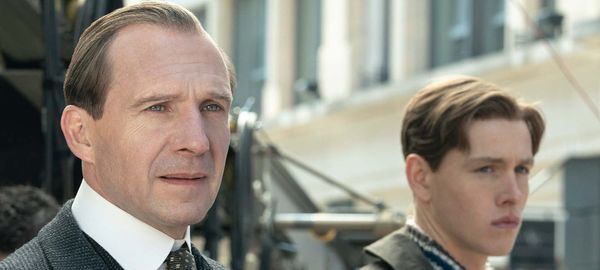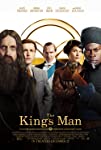Eye For Film >> Movies >> The King's Man (2021) Film Review
The King's Man
Reviewed by: Antoni Konieczny

When the violent, sassy adaptation of Mark Millar’s comic books, Kingsman: The Secret Service came out in 2014, many critics and audiences welcomed the story of a chav-turned-spy nicknamed Eggsy with enthusiasm. It was pretty much the best thing to happen to gun-heavy black comedies since In Bruges. The King’s Man, a prequel to Eggsy’s duology, displays some of the most unhinged moments in the series' career. Stylish as any of Matthew Vaughn's films and employing the Great War as its backdrop, it’s also bolder and arguably more ambitious than the previous two entries. Once again, Vaughn’s vision is over-the-top, mesmerising, and gruesome, but where it lags behind is by the virtue of its inconsistent messages.
This time around, it’s Ralph Fiennes as Orlando Oxford who takes on the mantle of a gentleman possessing a very particular set of skills and a personal trauma. With his wife (Alexandra Maria Lara) dying in his arms, the Duke of Oxford promises to keep their son Conrad out of the army. After coming back to England, the aristocrat starts a spy network along with his servants Polly (Gemma Arterton) and Shola (Djimon Hounsou), to prevent future conflicts. Now all grown up, Conrad does not share Orlando’s pacifistic ideals and wishes to enlist in the British military. Orlando preaches that “there are other ways of doing their duty” (for example, operating the first independent intelligence agency. Refined but brutal, civilised but merciless), and so off they go to face a Scottish separatist-led cabal which comprises evil henchmen including but not limited to Grigori Rasputin (Rhys Ifans), Gavrilo Princip (Joel Basman), Mata Hari (Valerie Pachner) and Lenin himself (August Diehl).

As far as casting goes, Fiennes and BAFTA Rising Star nominee Harris Dickinson establish a believable father-son relationship, but while the former has plenty of material to work with - the role takes him from sinking to ruthless - the idealistic Conrad gives Dickinson less opportunity to deliver a layered performance. By the time the Western Front set pieces arrive, however, the boy’s disillusionment with war is convincing and heart-wrenching. The antagonist’s portrayal - I will not give away the actor’s name as, despite its obviousness (a kid in the screening room accused the character of being the baddie upon his first appearance), it’s the climactic reveal - comprises, for the most part, an over-the-top voice performance, which suits the franchise well enough but does not quite much the erratic charisma of Ifans as Rasputin. Very much a love-him-or-hate-him character, one cannot deny Ifans’ commitment to the role.
From a technical standpoint, Vaughn and the cinematographer Ben Davies outdo themselves. A scorched no-man’s land, Rasputin’s ill-fated Christmas party, and the evil Scot’s mountain headquarters are all thrilling settings while each of the meticulously choreographed and sharply directed action sequences deliver on what endeared the franchise to moviegoers. The filmmakers are visibly less comfortable with the pathos-ridden interludes such as Conrad’s mother’s lecture on the responsibility of the privileged to help others in the time of crisis (with Boer families herded in the concentration camp in the background). When Vaughn wants to shock the audience, though, he does, and confidently so - an example here being the film’s major twist which, without giving too much away, brings to mind the original Kingsman or Sam Mendes’ 1917.
It’s clear from very early on that the film will be actively commenting on its setting. However, the effort often finds itself marked by a degree of confusion. The story translates the post-war narrative of classlessness onto spies seeing servants and nobles collaborate toward a common goal as equals. Utopian as it is, the idea additionally feels too much like a convenient plot device and offers little in the way of acknowledging the war’s amplifying effects on class issues. Not going into too much detail, one of the film’s more explicitly anti-war declarations is soon thereafter followed by Orlando’s formal abandonment of his pacifism; the film hilariously casts the same actor (Tom Hollander) as King George V, Kaiser Wilhelm II, and Tsar Nicholas II and yet proves largely conservative toward the monarchy; it has a Scottish separatist as the main antagonist, but it marginalises what could have been a compelling motive by focusing on the character’s overblown wickedness. With the sheer amount of talent on board, it’s a shame that the film struggles to balance many of its vast aspirations.
This Kingsman entry’s willingness to take on a more serious tone exposes many of the film’s imperfections. Throughout the spectacle, ambitions clash with contradictions; these inner conflicts prevent Vaughn’s film from reaching the faultlessly tailored heights of the original, but the craft, energy, and flashiness do not fail to impress.
Reviewed on: 05 Feb 2022

















